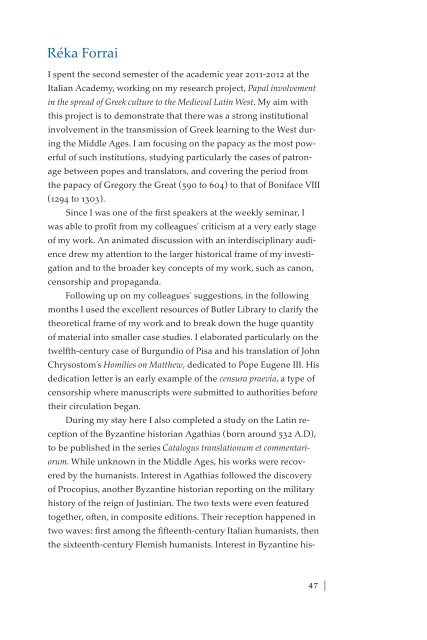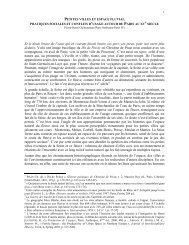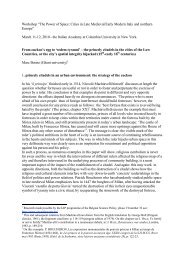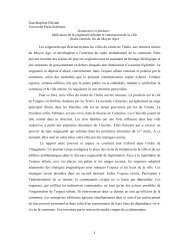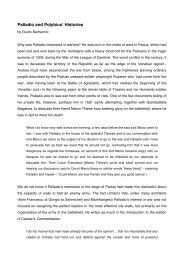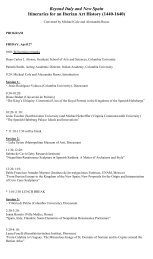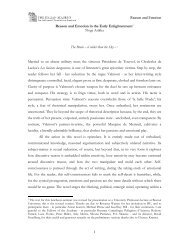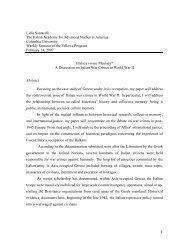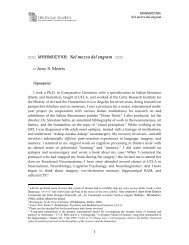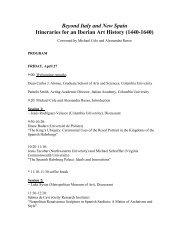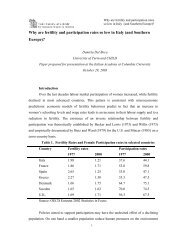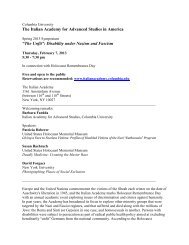2011-2012 - The Italian Academy - Columbia University
2011-2012 - The Italian Academy - Columbia University
2011-2012 - The Italian Academy - Columbia University
You also want an ePaper? Increase the reach of your titles
YUMPU automatically turns print PDFs into web optimized ePapers that Google loves.
Réka Forrai<br />
I spent the second semester of the academic year <strong>2011</strong>-<strong>2012</strong> at the<br />
<strong>Italian</strong> <strong>Academy</strong>, working on my research project, Papal involvement<br />
in the spread of Greek culture to the Medieval Latin West. My aim with<br />
this project is to demonstrate that there was a strong institutional<br />
involvement in the transmission of Greek learning to the West during<br />
the Middle Ages. I am focusing on the papacy as the most powerful<br />
of such institutions, studying particularly the cases of patronage<br />
between popes and translators, and covering the period from<br />
the papacy of Gregory the Great (590 to 604) to that of Boniface VIII<br />
(1294 to 1303).<br />
Since I was one of the first speakers at the weekly seminar, I<br />
was able to profit from my colleagues’ criticism at a very early stage<br />
of my work. An animated discussion with an interdisciplinary audience<br />
drew my attention to the larger historical frame of my investigation<br />
and to the broader key concepts of my work, such as canon,<br />
censorship and propaganda.<br />
Following up on my colleagues’ suggestions, in the following<br />
months I used the excellent resources of Butler Library to clarify the<br />
theoretical frame of my work and to break down the huge quantity<br />
of material into smaller case studies. I elaborated particularly on the<br />
twelfth-century case of Burgundio of Pisa and his translation of John<br />
Chrysostom’s Homilies on Matthew, dedicated to Pope Eugene III. His<br />
dedication letter is an early example of the censura praevia, a type of<br />
censorship where manuscripts were submitted to authorities before<br />
their circulation began.<br />
During my stay here I also completed a study on the Latin reception<br />
of the Byzantine historian Agathias (born around 532 A.D),<br />
to be published in the series Catalogus translationum et commentariorum.<br />
While unknown in the Middle Ages, his works were recovered<br />
by the humanists. Interest in Agathias followed the discovery<br />
of Procopius, another Byzantine historian reporting on the military<br />
history of the reign of Justinian. <strong>The</strong> two texts were even featured<br />
together, often, in composite editions. <strong>The</strong>ir reception happened in<br />
two waves: first among the fifteenth-century <strong>Italian</strong> humanists, then<br />
the sixteenth-century Flemish humanists. Interest in Byzantine his-<br />
47 |


